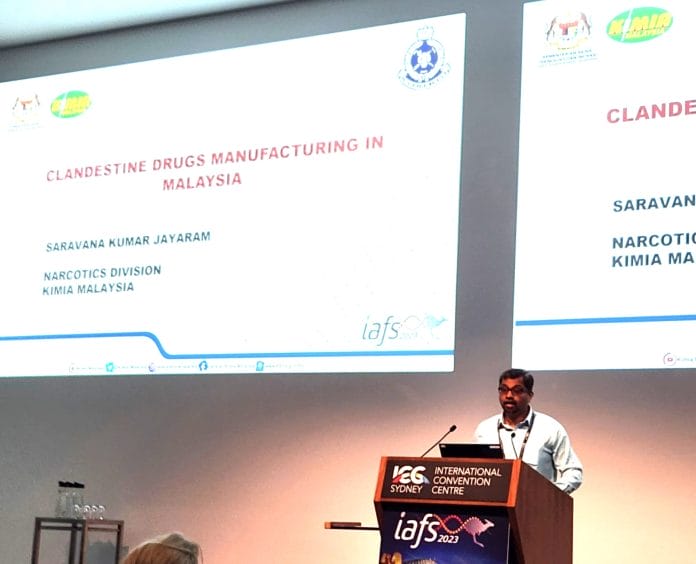In a significant stride towards global drug control, Malaysia has been implementing comprehensive strategies in combating the international drug menace.
Dr Saravana Kumar Jayaram, a leading Senior Forensic Chemist specialising in Analytical Chemistry and Illicit Drug Profiling at the Department of Chemistry Malaysia (KIMIA Malaysia), said that this multifaceted approach has been highly successful.
He was representing Malaysia at the 23rd Triennial Meeting of the International Association of Forensic Sciences in Sydney, Australia held last week.
“Malaysia’s approach includes a blend of rigorous law enforcement and advanced rehabilitation programs, underlining Malaysia’s prominent role in the global fight against illicit drugs,” said Saravana.
“Our country’s law enforcement agencies are well-equipped and trained, specialising in disrupting drug trafficking networks and preventing the entry of illegal substances into the country,” he said adding that the Royal Malaysia Police (‘PDRM’ or the Polis Diraja Malaysia) are among the best police forces in the world.
“Our police’s efforts are complemented with a strong legal framework that includes severe penalties for drug trafficking, aiming to deter involvement in the drug trade,” said Saravana, who is also Visiting Professor (Online) at Prince of Songkla University, Thailand.
“Additionally, Malaysia has been actively involved in international collaborations, working with neighboring countries and global organisations to curb the transnational drug trade. These efforts not only focus on enforcement but also on sharing intelligence and best practices in drug interdiction.”
Apart from enforcement, Malaysia has made significant strides in treating drug addiction as a public health issue.
“The government has implemented comprehensive rehabilitation programs, offering medical and psychological support to individuals battling drug addiction. These programmes aim to reintegrate recovering addicts into society as productive individuals, reducing the likelihood of relapse. Furthermore, Malaysia has been exploring harm reduction strategies, such as needle exchange programmes, to minimise the spread of diseases among drug users,” he explained.
“This balanced approach highlights Malaysia’s commitment to addressing both the supply and demand aspects of the drug problem, acknowledging the complexity of the issue and the need for a holistic response.”
He also shared insightful information about drug trends, synthesis techniques and regional expertise in illicit drug production.
Saravana emphasised the importance of collaboration and expanding research networks to address these evolving challenges effectively. His presentation focused on various types of drugs that are clandestinely manufactured, including synthetic drugs like methamphetamine and ketamine.
Detailed explanations were given on the production processes, shedding light on the specific chemicals and precursors used in these clandestine operations. Notably, the practice of mixing or cutting drugs in labs, particularly with substances like benzodiazepines, was highlighted as a growing concern.
He also delved into the future plans to tackle the problem of illicit drug production and distribution.
“A significant part of the strategy involves enhancing scientific methodologies and equipping laboratories with advanced instrumentation for better detection and analysis of these drugs. By improving detection capabilities, authorities can more effectively identify and intercept illegal drug manufacturing and trafficking activities,” said Saravana.
“The development of new methods for drug detection is crucial, as the constantly evolving nature of synthetic drug production often outpaces current detection technologies.”
He closed his presentation by stressing on the critical need for continued research and collaboration in combating the illicit drug trade.
“By combining scientific innovation in drug detection with robust law enforcement strategies, there is potential to make significant strides in addressing this global issue.
“The international drug problem is a highly complex one and the multifaceted approach required to effectively tackle it encompasses blending science, law enforcement and international cooperation,” said Saravana, who is today one of Asia’s subject matter experts on this subject.









